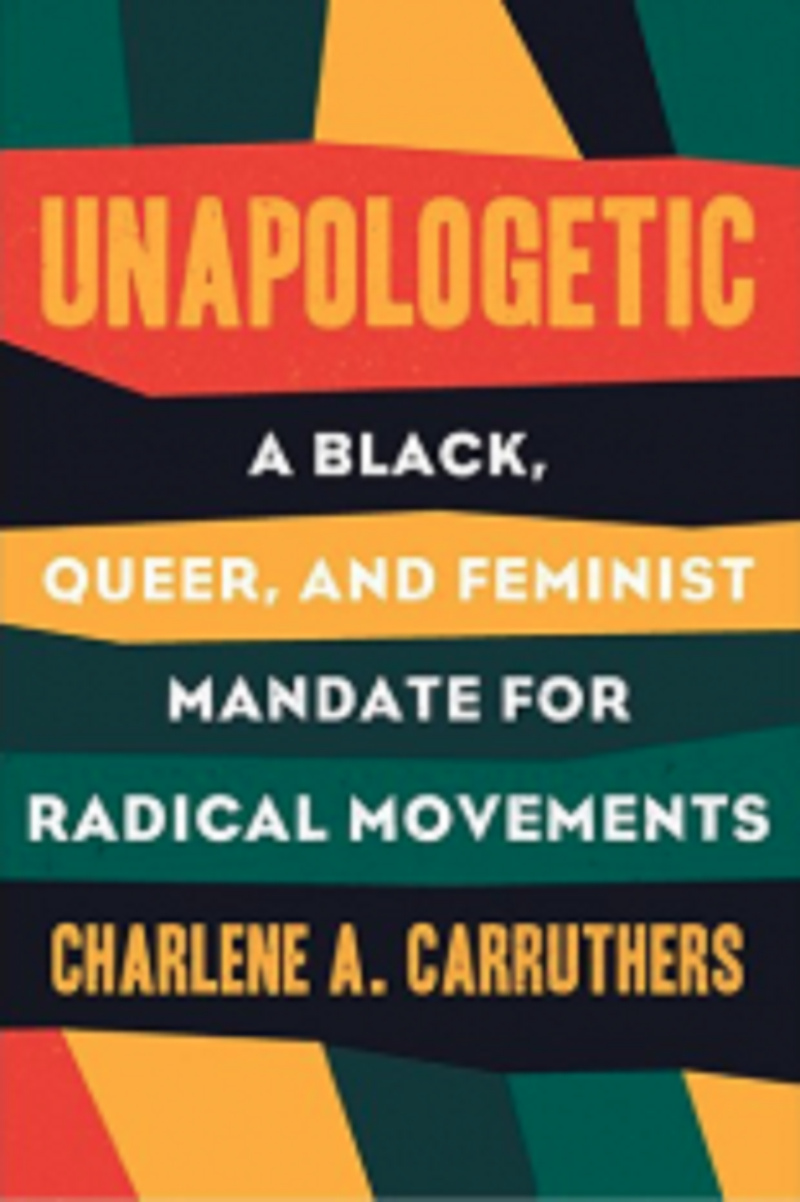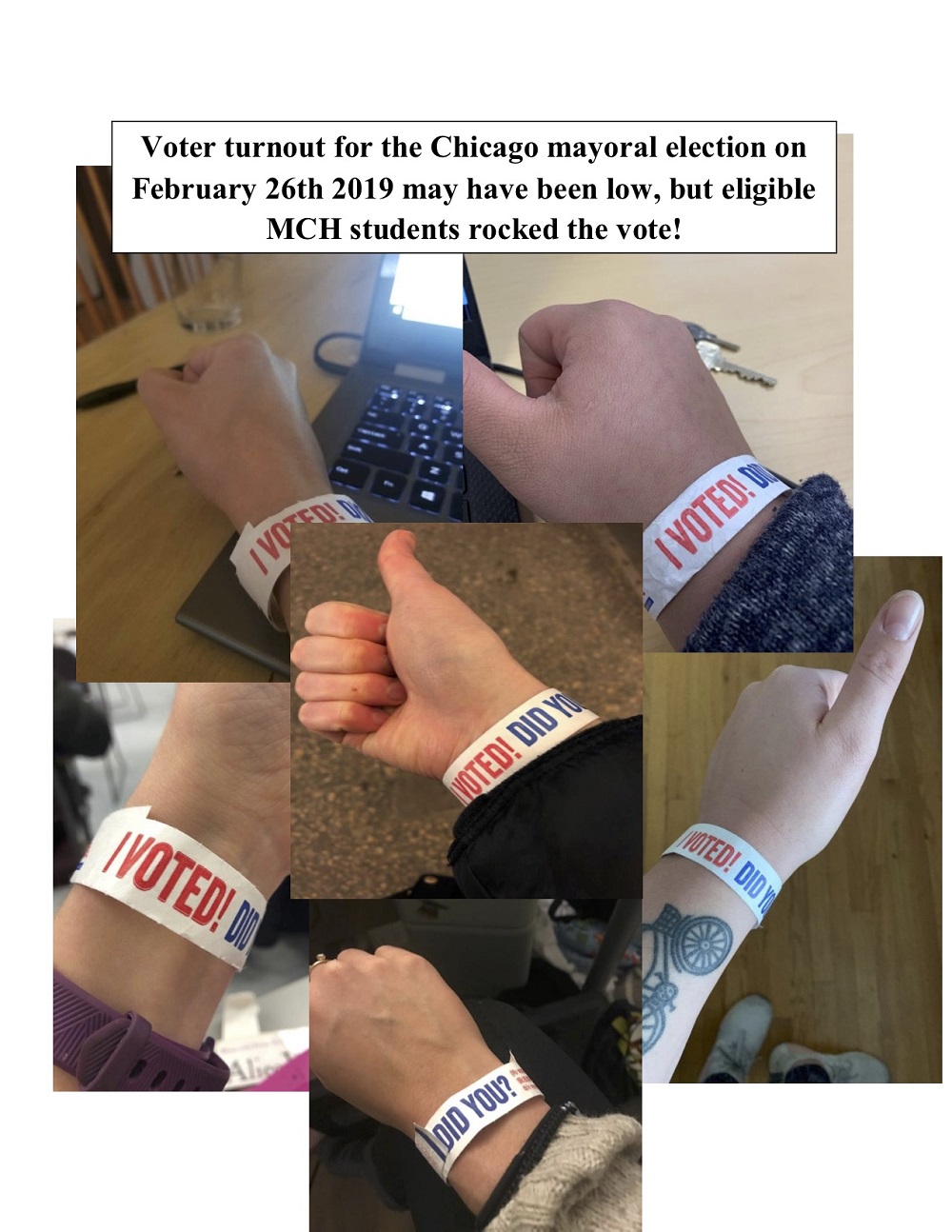Monthly Archives: March, 2019
REFLECTIONS ON “UNAPOLOGETIC: A BLACK, QUEER AND FEMINIST MANDATE FOR RADICAL MOVEMENTS” Heading link

Posted: March 26th, 2019
Author: Gabrielle Lodge, MPH(c) Community Health Sciences, Maternal and Child Health
Charlene Carruthers is a black queer feminist activist and organizer with over 15 years of experience in racial justice, feminist and youth leadership development movement work. On Thursday February 7th, 2019, the UIC Center of Excellence in Maternal and Child Health hosted Carruthers to give a lecture about her book Unapologetic: A Black, Queer and Feminist Mandate for Radical Movements. This blog post is a synthesis of that event and my reflections on both that event and Carruthers’ book. Carruthers sought to write a book for long-time movement builders and activists, for those curious about those doing the work, and how to get involved. As a young organizer and leader for BYP 100, Charlene found herself hungry for the history of other organizers and activists that created the path for her own activism. Carruthers started her lecture by sharing a quote by Toni Morrison, “If there is a book that you want to read that hasn’t been written yet, you have to go out and write it” (Carruthers, 2019). With that inspiration, and after writing and reflecting for 4.5 years, Charlene set out to do just that with Unapologetic.
In Charlene’s first chapter titled “All of Us or None of Us”, she quotes the Combahee River Collective. The Combahee River Collective was founded by black feminists and lesbians that explored the intersection of multiple oppressions, including racism and heterosexism (Anders, 2012). This organization was active in Boston from 1974 to 1980. Carruthers quotes the work of the Combahee River Collective: “‘This focusing upon our own oppression is embodied in the concept of identity politics. We believe that the most profound and potentially most radical politics come directly out of our own identity… If Black women were free, it would mean that everyone else would have to be free since our freedom would necessitate the destruction of all the systems of oppression’” (Carruthers, 2018, p. 1). This quote awakened me, as a black queer Muslim woman, to understanding how black liberation leads to collective liberation. I became hyperly aware of how the work I do and other folks do with the most marginalized communities can mean freedom for all. Moreover, this became personal for me, as I have specific identities that intersect that are relevant and, in a way, the commitment to this work also means liberation for me as well for a collective. I also realized that my role in maternal and child health is not as siloed as I thought it was. Understanding and demanding equity for black women’s health, specifically related to maternal mortality, is all connected and can be a catalyst to liberation.
Charlene read the quote shared above and after reading this quote, she spoke about identity politics in the U.S. which are rooted from lived experiences that impact how people act in the world. Carruthers makes a distinction in her lecture by stating that “just because you have a particular identity does not mean you are right about everything and/or have the best analysis in the room” (Carruthers, 2019). She furthers this by stating that “It is a choice to pick up a set of political values; However, it does take study to have a wide view of the structural conditions that we live under” (Carruthers, 2019). I was drawn to this point for many reasons. To start, it reminded me of the importance of having a collaborative approach when organizing and including many voices. I also reflected on my own intersecting identities, many which are accompanied by oppressive forces. However, even in recognizing that, I understand that my role is fluid within the fight for justice and that it means that I am not always the best fit to lead on an issue. We each have to find our own place in the movement and that is part of the work. I understand that living in a hierarchical society places power and privilege given to those in leadership roles and that is problematic. I hope to complicate this notion in my future work as a midwife. Being a midwife should not give me power or higher positionality, but it will mean I have a set of specialized skills that I can contribute to a team to support a person during childbirth. This reminds me of the responsibility we each have as we navigate the system.
This is a lifelong commitment that we each need to make everyday and as Carruthers’ said, it is a choice. This was a reminder that we should all be lifelong learners. Carruthers shared her own political evolution that is critical because as the face of oppression is ever evolving, we need to evolve with it. We need to make a conscious choice to act against oppression in society. With that, this includes allies as well. I am reminded of discussion that made the point that, being an ally, is a verb, not a noun. The work of social justice in general is not a place you get to, it is an active choice that we all must make every day, in every interaction.
Charlene continued her lecture by speaking about her chapter called “The Five Questions”. This chapter is to allow readers to move through the questions to determine the work that they will be up to. The five questions are: “Who am I? Who are my people? What do we want? What are we building?”. In her lecture she asked additional sub-questions that resonated with me and allowed me to expand my thinking on how I want to approach my current and future work.
For ‘Who Am I?’ Carruthers (2019) asks “What’s the thing that gets you up most mornings? What are you best positioned to do?”. She continues by stating that there are many ways that we can show up in meaningfully. For ‘Who Are My People?’Carruthers asks who are you actually responsible for and to? Who are you connected to? She states that this is a representation of what and who you care about and what gets you moving. For ‘What Do We Want?’ Carruthers ask us “Do we want bandaid solutions that help some people but not all people, or do we want transformation? What are we fighting for?” (Carruthers, 2019). For ‘What Are We Building’ Carruthers asks us, ‘What is it that you’re actually building?’. Lastly for ‘Are We Ready to Win’ Carruthers states that “It is okay to say no, but get ready”.
These questions gave me a better understanding and allowed me to question my positionality in the future work that I hope to do. As previously shared, I hope to become a Nurse-Midwife and I hope to consistently ask myself these questions as I work towards lessening Black maternal mortality health disparities. Carruthers prompted the audience full of public health and health science students: “What systems are you all creating for us? Who’s going to keep people well? We need you!”. It is clear that the health care system, and medical industrial complex has not worked for the collective, and even detrimental to many populations particularly LGBTQ , Black, Indigenous, and communities of color. Carruthers lecture allowed me to reflect on how I can work with individuals while advocating for better policies and systems to create a better healthcare system for all.
People in healthcare and public health may ask what their role is. Carruthers answer is simple: “You all keep us alive, if we are going to win we need those radical folks in public health, we need Radical Public Health” (Carruthers, 2019). An interesting historical understanding Carruthers shares is from studying post-revolution. She shares, “Health outcomes and disease were one of the biggest threats to independence. So imagine when we win and when we continue to win, that y’all are all part of that, and you don’t need to be an organizer to do that, but to actually radicalize your field, you all help us keep alive. That is tremendous work” (Carruthers, 2019).
Charlene Carruthers’ book and lecture gave me a better understanding and inspiration to be more radical in my public health work. As a black, queer Muslim woman that aligns with feminist values this book and lecture allowed me to better understand my place in the work for black liberation. The Combahee River Collective quote was a reminder of why I am a Public Health student in Maternal and Child Health. The black maternal health crisis is the work I hope to focus on. This book was a reminder of how I want to make my work more radical, more queer, and more feminist.
References
Anders, T. (2012) Combahee River Collective (1974-1980). Retrieved from https://www.blackpast.org/african-american-history/combahee-river-collective-1974-1980/
Carruthers, C. (2018). Unapologetic: A Black, Queer and Feminist Mandate for Radical
Movements. Beacon Press.
Carruthers, C. (February, 2019). A Lecture By Charlene Carruthers: Unapologetic: A Black,
Queer and Feminist Mandate for Radical Movements. Presented at the University of
Chicago Illinois Center of Excellence in Maternal and Child Health.
